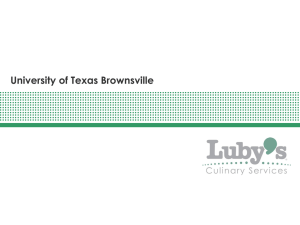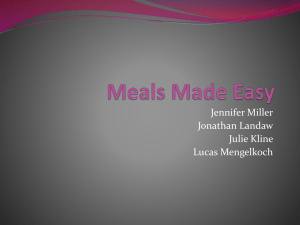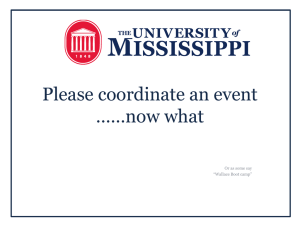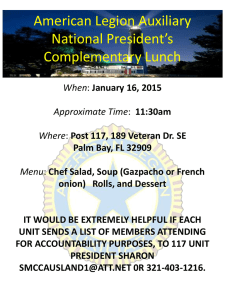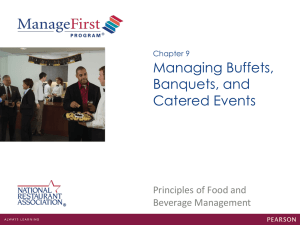Food and Beverage Division
advertisement
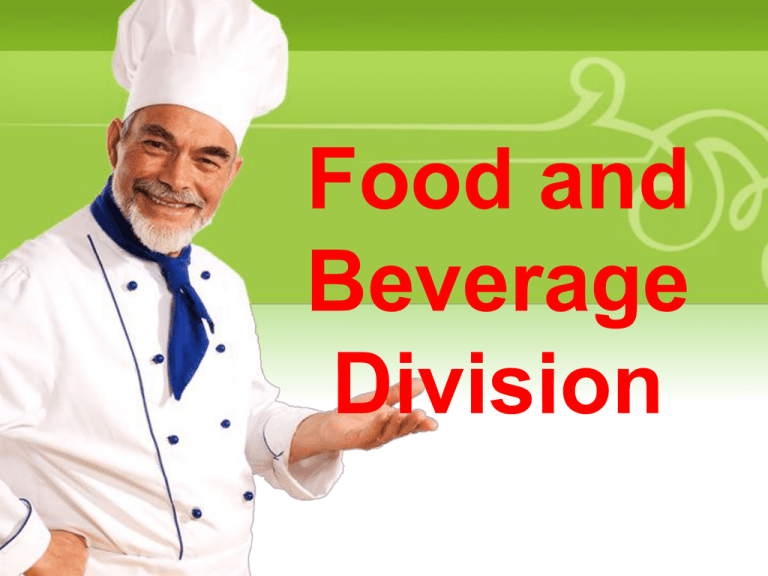
Food and Beverage Division Responsibilities of the Food and Beverage Division • Your Description Goes Here • The delivery of food and beverage service to guests in all its outlets, guestrooms, function rooms, and outside catering in accordance with prescribed standards; • Maintaining the goodwill of patrons and guests through effective guest relations, proper handling of guest complaints, inquiries and requests; • Ensuring the attainment of sales forecasts through the administration of promotional strategies and suggestive selling techniques; • Ensuring the consistent implementation of the company’s internal control program which include budget control, cost control, quality assurance and other related areas; • Preparing drink and wine list; • Coordinating with the kitchen and other departments on matters pertaining to food preparation and service; Food and beverage service among hotels, restaurants and food outlets are handled by the Food and Beverage Services Department, under the command and responsibility of the Food and Beverage Manager or Director of Food and Beverage (Food and Beverage Director) When there are voluminous and complex operations, there maybe a need for further division of labor that require a creation of sub-units which will be supervised by supervisors or section heads. Among the sub-units are: • • • • • • Catering and Banquet Restaurant Stewarding Bar Kitchen Room Service Organizational Chart of the Food and Beverage Division • Your Description Goes Here Food and Beverage Director or Manager Outlet Manager or Supervisor Room Service Manager or Supervisor Bar Manager or Supervisor Banquet Manager or Supervisor Captain Waiter Room Service Captain Bar captain Banquet Captain Waiters Busboys Bartender Room Service Order Taker Rooms Service Waiter Bar Attendants Bar Boys Banquet Waiters Banquet Receptionists/ Attendants Job Description: Food and Beverage Manager Basic Function: Plans, organizes, directs and controls the delivery of service in all outlets, guestrooms, and banquets and sees to it that policies and standards are complied with. • Directs and organizes the activities of the food and beverage department to maintain high standards of food and beverage quality, service, and merchandising to maximize profits. • Develop, implement, and monitor schedules for the operation of all restaurant and bars to achieve a profitable result. • Participate with the chef and restaurant managers in the creation of attractive menus designed to attract a predetermined customer market. • Clearly describe, assign , and delegate responsibility and authority for the operation of the various food and beverage sub departments. • Implements effective control of food, beverage, and labor costs among all departments. Headwaiter or Outlet Supervisor Basic Function: Oversees food and beverage operations in his assigned outlet, ensures that service is carried out in accordance with prescribed standards and policies. Captain Waiter Basic Function: Oversees the set-up and delivery of service in his/her assigned station. Receptionist Basic Function: Welcomes and greets customers at the entrance and escorts them to their tables. Waiter Basic Function: Takes and serves food and beverage order according to prescribed standards of service. Busboy Basic Function: Dining room helper and runner. Bartender Basic Function: Prepares / mixes alcoholic and non-alcoholic beverages according to prescribed standards. Barboy Basic Function: Acts as runner and helper in the bar. • Your Description Goes Here Executive Chef Head of the kitchen Duties and Responsibilities: • Responsible to the Director of Food and Beverage for the efficient and effective operation of kitchen food production. • To exceed guest’s expectations in the quality and quantity of food, its preparation, taste, and portion size • Operates the kitchen in accordance with company policy and strives to achieve desired financial results. Sous Chef (French word meaning “under”) Basic Function: Responsible for the day-to-day running of each shift Chef de partie (Line chef) These stations are organized according to production tasks, based on the classic “brigade” introduced by George Auguste Escoffier. ENGLISH FRENCH DUTIES Sauce Chef Saucier (sau*see*ay) Preapres sauces, stews, sautés, hot hors dbeuvres) Fish Chef Poissonier (pwa*so*ay) Cooks fish dishes Roast Chef Rotisseur (ro*tee*sur) Roasts, broils, grills, and braises meats Relief Chef Tourmant (tour*nant) Relieves station chefs Vegetable Chef Entremetier (aun*tre*me*tee*ay) Prepares vegetables Pastry Chef Patissier (pa*tis*see*ay) Prepares all hot and cold dessert items Pantry Chef Garde manger (gard*mon*zhay) Prepares all cold food: salads, cold hors dbeuvres, buffet food, and dressings Many commercial hotels, motels, and similar lodging operations operate food and beverage facilities that are normally open to guests of the property and to the general public. These facilities include formal and informal restaurants: • Specialty restaurants • Coffee shops • Snack bars • Cafeterias Hotel restaurants are run by a restaurant manager in much the same way as other restaurants. Generally, he/she is responsible for the following: • • • • • • Exceeding guest service expectations Hiring, training, and developing employees Setting and maintaining quality standards Marketing Room service, mini-bars, or the cocktail lounges Presenting annual, monthly and weekly forecasts and budgets to the food and beverage director. Compared with other restaurants, some hotel restaurants offer greater degrees of sophistication. This necessitates additional food preparation and service skills and training. Compared to free standing/independent restaurants, it is more difficult for hotel restaurants to operate at a profit. They usually are open from early morning until late at night and are frequently under-patronized by hotel guests who tend to prefer to eat outside of the hotel at independent restaurants. • Your Description Goes Here Hotel bars allow guests to relax while sipping on a cocktail after a hectic day. This opportunity to socialize for business or pleasure is advantageous for both guests and the hotel. Bars are an important revenue source for the food and beverage departments. Bars are run by Bar mangers. The responsibilities of a bar manager include: • Supervising the ordering process and storage of wines • Preparing wine list • Overseeing the staff • Maintaining cost control • Assisting guests with their wine selections • Proper service of wines • Knowledge of beers and liquor and their service Kinds of Bars: • Lobby Bar. This convenient meeting place was popularized by Conrad Hilton. • Restaurant Bar. This bar is always the hub of the lobby. • Service Bar. This bar services all the bars in the hotel • Catering and Banquet Bar. This bar is used specifically to service all the catering and banquet needs of the hotel. • Pool Bars. These are popular at resort hotels, where guests can enjoy a variety of exotic cocktails poolside. • Sports Bar. The main attraction is sporting events. • Night Clubs. Some hotels offer guests evening entertainment and dancing. • Mini-bars. These are small, refrigerated bars in guestrooms. • Your Description Goes Here The Chief steward is responsible to the director of food and beverage for the following functions: • Cleanliness of the back of the house • Maintaining clean glassware, plates, and cutlery for the food and beverage outlets • Maintaining strict inventory control and monthly stock check • Maintenance of dishwashing machines • Inventory of chemical stock • Sanitation of kitchen, banquet aisles, storerooms, walk-in freezers, and all equipment • Pest control and coordination with exterminating company • Forecasting labor and cleaning supplies • Your Description Goes Here The term room service has for some time referred to all service to hotel guest rooms. Recently, some hotels have changed the name of room service to in-room dining to present the service as more upscale. The intention is to bring the dining experience to the room with quality food and beverage service. Challenges in operating room service: • Delivery of orders on time • Making room service a profitable food and beverage department • Avoiding complaints of excessive charges for room service orders The organizational challenge of room service management consists of mise en place, arranging everything in the correct place and ready for action. The system for guest ordering is organized in two ways: • by telephone •By doorknob hangers for breakfast orders Flow of service in in-room dining: • The room service order takes the order and makes out a bill. • Gives one copy to the kitchen and one to the servers in modern hotel, inputs order through the MICROS system • During quieter periods, the room service order taker helps with setting up the trays and carts The most popular meal for room service is breakfast, even though some hotels provide room service twenty-four hours a day. Room service menu typically include items that are similar to or the same as those offered on menus in the public rooms. However, the prices for items offered on room service menus are normally higher than regular menu prices. • Your Description Goes Here The Director of Catering is responsible to the Food and Beverage Director for the selling and servicing, catering, banquets, meetings, and exhibitions in a way that exceeds guests’ expectations and produces reasonable profit. The Director of Catering has a close relationship with the Director of Sales and Marketing and the Rooms Division Manager because the catering department brings conventions, which requires rooms, to the hotel. There is also a close working relationship with the Executive Chef. The chef plans the banqueting menus but the catering manager must ensure that they are suitable for the clientele and practical from a service point of view. The Director of Catering must be able to do the following: • Sell conventions, banquets, and functions • Lead a team of employees • Together with input from team members, make up departmental goals and objectives. • Set individual and department sales and cost budgets • Set service standards • Ensure that the catering department is properly maintained • Be very well versed in the likes, dislikes, and dietary restrictions of various ethnic groups. Catering has a broader scope than banquets. • Banquet, this refer to groups of people who eat together at one time in one place. • Catering, this includes a variety of occasions when people may eat at varying times, usually outside the hotel premises. Some occasions for celebrations, banquets, and catering includes the following: • State banquets • National days • Business and association conventions and banquets • Gala charity ball • Company dinner dances • Weddings and all social functions How to book a function: • Enquiry. A call from prospective clients to the director of catering, or cold calls by catering sales manager to seek prospective clients. • Check for space available in the “bible” or the computer program. – Bible is a function book in which a permanent record is maintained of each function rooms availability, tentative booking, or guaranteed booking. • Confirm availability and suggest menus and beverages. Invite client to view hotel. • Catering prepares a contract and creates a proposal and a pro-forma invoice for client. This enables client to budget for all costs. • Catering manager makes any modifications and sends client a contract detailing events, menus, beverage and costs. • Client confirms room booking, menus, and beverages by returning the signed contract. The most frequent catering events in hotels are the following: • • • • • Meetings Conventions Dinners Luncheons Weddings and social functions For meetings, a variety of room setups are available, depending on a client’s needs. The most frequently selected meeting room setups are as follows: • Theater style. Rows of chairs are placed with a center group of chairs and aisles. • Classroom style. As the name suggests, tables, usually slim 18-inch ones, are used because meeting participants need space to take notes. Classroom style setup usually takes about three times as much space as theater style, and takes more time and labor to setup and break down. • Horseshoe style. This type of meeting setup is frequently used when interaction is sought among the delegates, such as training sessions and workshops. The presenter or trainer stands at the open end of the horseshoe with a black or white board, flip chart, overhead projector, and video monitor . • Bouquet style. Dinners are generally catered at round tables of eight or ten persons for large parties and on boardroomstyle-tables for smaller numbers. The Director of catering holds daily or weekly meetings with key individuals who will be responsible for the upcoming events. The purpose of the meeting is to avoid any problem and to be sure that all key staff know and understand the details of the event and any special needs of the client Those in attendance should be the following: • • • • • • • • Director of Catering Executive Chef and/or Banquet Chef Beverage Manager or Catering Bar Manager Catering Managers Catering Coordinators Director of Purchasing Chief Steward Engineering Supervisor • Catering Coordinator – He/she manages the office and controls the “bible” of function diary. He or she must see that the contracts are correctly prepared and check on numerous lastminute details. • Catering Services Manager – Responsible for delivering higher-than-expected service levels to guests – He or she is in charge of the function from the time the client is introduced to the catering service manager by the director of catering or catering manager • Supervise the catering house person in setting up the room • Schedules the banquet captains and approves the staffing levels for all events • Checks that the client is satisfied with the room setup, food, beverages, and service • Makes out client bills immediately after the function. The End
